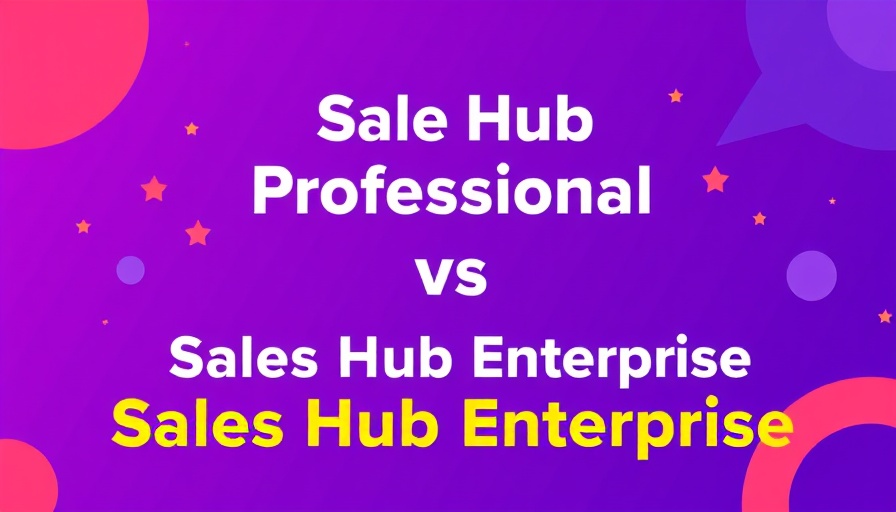
The Crucial Comparison: Sales Hub Professional vs. Sales Hub Enterprise
In the world of digital marketing and sales today, effective tools can significantly enhance a business's performance. HubSpot's Sales Hub offers two primary configurations—Professional and Enterprise—each tailored to meet varying needs. Understanding the differences can empower business owners, marketers, and sales professionals to make informed decisions that align with their objectives.
What Sets Them Apart?
Sales Hub Professional is designed for teams that are ready to scale, offering advanced tools for automation, reporting, and analytics that help manage customer relationships without overwhelming users. In contrast, Sales Hub Enterprise caters to larger organizations needing deeper customization, advanced reporting capabilities, and extensive integration options. This comprehensive suite addresses not just sales tracking but optimizes all facets of the business's customer engagement strategy, serving well in complex sales environments.
Key Features You Should Know
Understanding the features of both tiers is vital. Sales Hub Professional includes essential tools like pipeline management, meeting scheduling, and Slack integrations, enabling teams to collaborate effortlessly. But Sales Hub Enterprise adds the critical elements that larger teams often require: custom reporting, predictive lead scoring, and advanced automation tools. Additionally, Enterprise users benefit from enhanced AI capabilities, allowing for better engagement and conversion strategies.
Budget Considerations
Another pivotal aspect is budget. Sales Hub Professional is priced at a lower tier, making it more accessible for small to medium-sized businesses. However, Sales Hub Enterprise comes with a higher price tag but justifies this through the range of advanced features it offers. When weighing the investment, businesses must consider their growth trajectory and how much value these advanced features could generate.
Real-World Applications
Many companies have reported significant improvements in their sales operations after adopting the right Sales Hub configuration. For instance, a mid-sized SaaS company leveraging Professional was able to automate its follow-ups, resulting in a 30% increase in lead engagement. Meanwhile, a large enterprise that adopted the Enterprise tier experienced a doubling of its sales closing rate through custom automation workflows tailored to varying team sizes and specialties.
Future Trends in Sales Automation
As digital marketing evolves, so does the functionality of tools like Sales Hub. Experts predict increasing integration with AI and machine learning technologies, which will elevate user experiences and provide deeper insights into customer behavior. Companies investing in tools now will be positioned to harness these trends, ensuring they remain competitive. Additionally, challenges around GDPR compliance will likely shape how these sales tools are developed, particularly around data management.
Conclusion: Making the Right Choice
Choosing between Sales Hub Professional and Sales Hub Enterprise ultimately depends on your business needs, team size, and growth potential. It's essential to weigh the features, pricing, and potential ROI each provides. By doing so, you can optimize your sales process, improve customer engagement, and ultimately drive revenue growth.
For further insights and guidelines on maximizing your sales strategy, subscribe to industry news and updates about digital marketing tools.
 Add Row
Add Row  Add
Add 




 Add Row
Add Row  Add
Add
Write A Comment